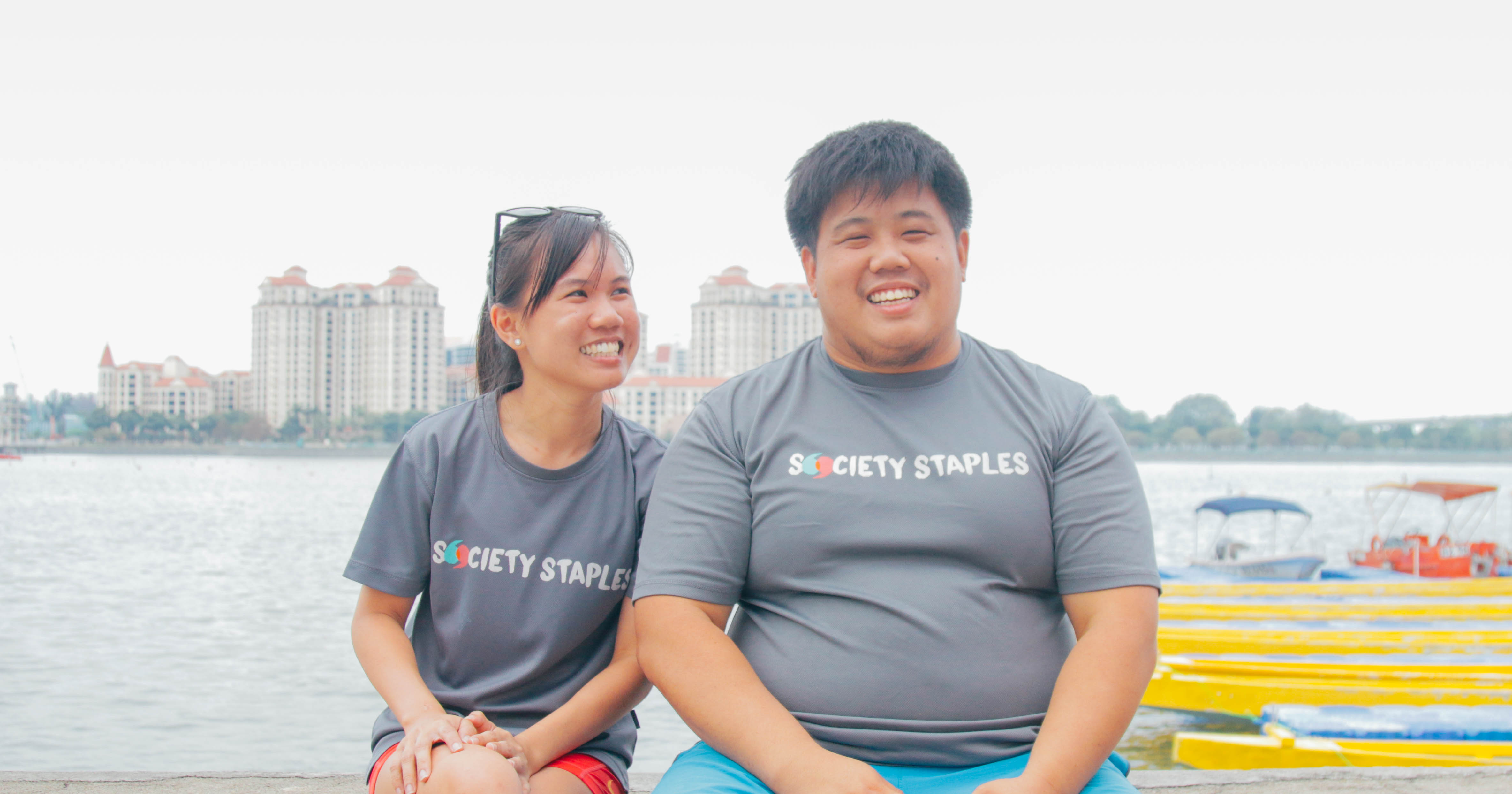You might assume that having grown up in a family with two brothers on the autism spectrum, Debra Lam would be predisposed to championing causes involving people with disabilities (PWDs).
For the 26-year-old, that wasn't the case.
In fact, throughout much of her adolescence, Lam admits she wasn’t too fond of her elder and younger brothers.
Describing herself as a “very, very privileged student” who was often nominated by her teachers for extra-curricular educational opportunities, Lam couldn’t understand why her elder and younger brothers weren’t doing as well as her in school.
She says:
“It never occurred to me that my brothers were actually having challenges due to their disability. But the perception I got was, ‘Oh, my brothers were just lazy.’ And that’s why they were just not performing, and as a result, they didn’t get any opportunities.”
More than that, Lam was also embarrassed by her brothers’ disabilities.
Having seen and heard stories of how they were ostracised and bullied at school, Lam was worried that by association, the same stigma would spread to her:
“In primary school, I didn’t dare to tell people I actually had brothers who were special, because I saw how my brothers were bullied. Both of them went to mainstream schools, and were bullied quite badly. And I kind of got the impression that if people knew I had brothers who are special, they are going to treat me differently as well."
"Why do you think that of your brother?"
Enter Lam's boyfriend, Ryan Ng.
The 28-year-old first met Lam when they were in secondary school.
He was the only other person she knew who had a sibling with a disability.
Ng’s younger brother has William’s Syndrome, a rare genetic disorder characterised by distinctive facial features and intellectual disability.
While it took Lam a long time to come to terms with her brothers’ disabilities, Ng’s perception of PWDs was very different.
Lam says:
“I was just blabbering about how annoying my brothers were and all of that. And then [Ng] came back and was just like ‘Why do you think that of your brother? I love my brother, I think he’s amazing.'”
Indeed, if Lam’s childhood experience with her siblings was marked with a struggle to accept their disabilities, Ng’s could be characterised by blissful ignorance:
“Ryan has always lived in this perfect bubble where he thought everyone was super accepting, super embracing.”
On a mission to forge an inclusive future
Today the couple are the co-founders of Society Staples.
It is a social enterprise that seeks to foster greater social inclusion for PWDs in Singapore.
Its establishment speaks of the journey and growth that the pair have been through together.
For Lam, it involved coming to terms with and embracing her brothers for who they are.
For Ng, it meant recognising that society is not as inclusive or welcoming to PWDs as he had always thought.
It’s no surprise then, that these two narratives seem to be the driving force behind the company's mission to “create an inclusive future where every PWD can maximise his/ her potential and be embraced as an integral member of their society”.
Society Staples mission
Founded in 2015, Society Staples runs events and programmes that are designed to spread awareness of the challenges that PWDs face, while encouraging participants to be more inclusive.
They are perhaps best known for their signature team building programme that involves simulating either a visual or hearing disability for participants and getting them to paddle a dragon boat.
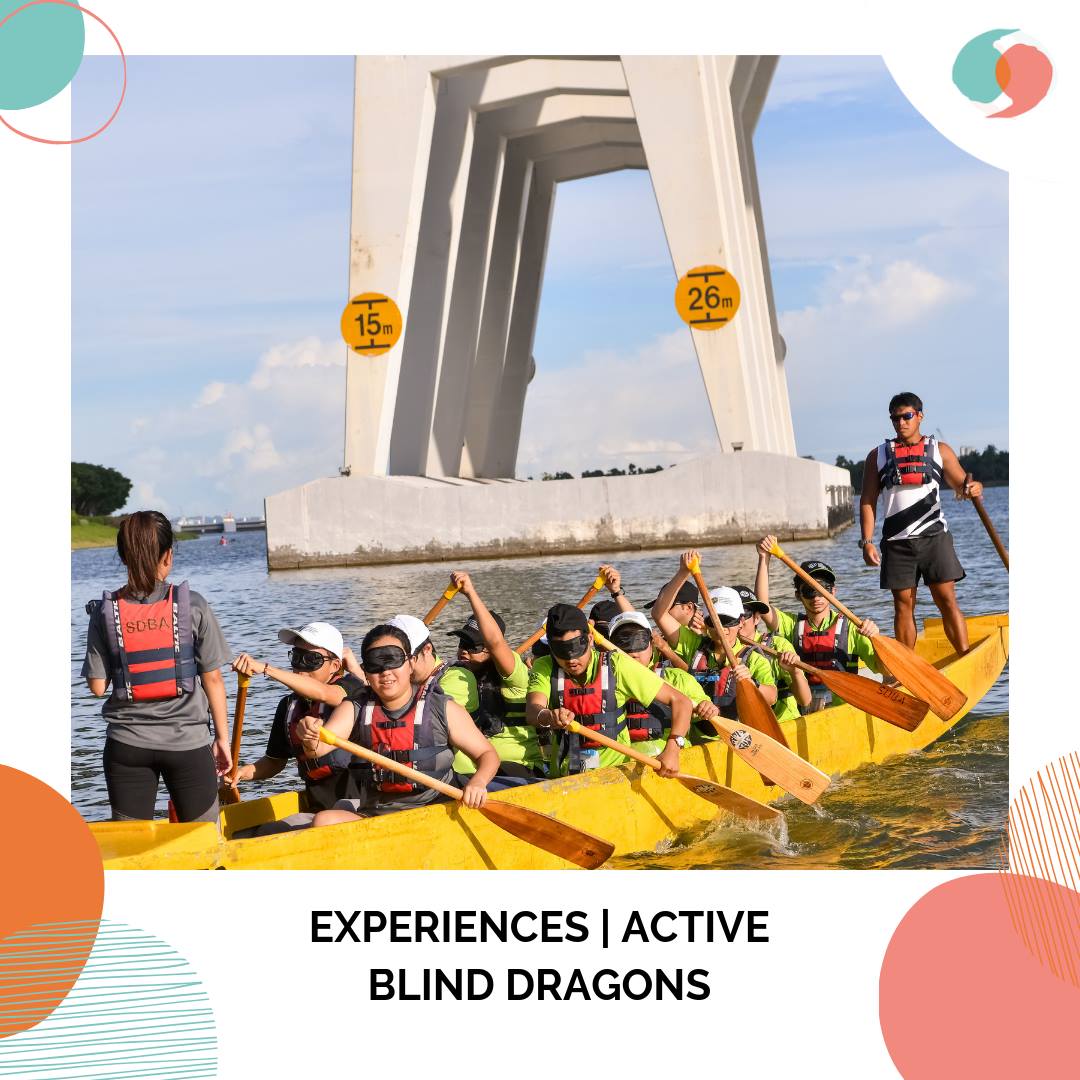 Society Staples's Blind Dragons team-building experience. Photo via Society Staples Facebook page
Society Staples's Blind Dragons team-building experience. Photo via Society Staples Facebook page
Additionally, they also manage and train the Different Dragons, a dragon boat team made up of both PWDs and people without disabilities.
Happy-go-lucky beginnings
Ng first became aware of the need for an organisation such as Society Staples in 2011, when he came across a news story reporting on a group of special needs teachers making nasty remarks about their students.
Lam says:
“He was really, really affected, and when he saw that and he shared that article with me. I responded and I said 'Oh this is my everyday reality'. And to him, he was like 'No, if this is really what’s happening then we better do something'.”
That something was dragon boating -- a sport that both Ng and Lam were passionate about.
Lam adds:
“So because both of us were dragon boaters, he had this idea and he said when we tell people we are dragon boaters, the kind of impression and the comments that we get is like ‘Oh, it’s so tiring, it’s so draining, it’s such a tough sport.’
And to Ryan, he was like, if we can train up an entire team of people with disabilities in dragon boating and they can perform as well as anyone else, that will really be making a statement that they’re not different.”
With that, Ng pitched his idea to an online youth ideas competition before roping Lam in when he managed to make it through to the final round.
“I was having my poly exams so I didn’t join him [during the preliminary rounds of the competition]. I remember I walked out of the exam hall, and then I looked at my phone and he was like ‘Hey! We’re going to pitch at the finals like two weeks later.’
And I was like, ‘What are you talking about? What is this finals that I didn’t even sign up for?’ And he was like ‘I told you about this dragon boat team?’ And I was like ‘Oh my god, you’re real? You’re serious?’”
Really won competition
Going into the finals, Lam did not think they stood a chance.
The other two teams in the finals -- decked out in suits and ties -- were from NUS and SMU, while Lam and Ng, joined by a friend who was still secondary school, had decided that business casual would suffice.
“Just a shirt and a pants,” says Ng with a laugh. “Even the secondary school boy had to borrow his father’s clothes... His clothes were all baggy.”
“I don’t know how. Amazingly, we won,” says Lam.
She says:
“I still remembered when I was going up the stage to actually take the cheque I was in complete disbelief, and when I was coming down the stage I was scolding Ryan! I was like ‘Now you got me into this whole sh*t, and now we actually win.’”
Lam’s recollection of their happy-go-lucky beginnings are punctuated by Ng’s laughter.
He adds that she no longer had exams, and hence no longer had any reason not to help him.
The Deaf Dragons
With the money they won from the competition, the couple started a dragon boat team in March 2012 called the Deaf Dragons, with a crew made up entirely of deaf individuals.
The team quickly gained prominence, finishing first in the adaptive category of the Club Crew World Championships in Hong Kong, a mere five months after they first started training.
And while this was -- by all definitions -- an impressive feat, Lam and Ng had bigger things in mind for the team.
They didn’t just want to show that PWDs had the capability to paddle a dragon boat.
They wanted to demonstrate that PWDs could compete and hold their own against crews manned by paddlers without disabilities.
By 2014, Lam and Ng decided that the members of the Deaf Dragons needed to be putting in some extra work in the gym if they were to reach the levels required to be truly competitive.
They put together a gym programme for the athletes to complete on the days when they were not having team training.
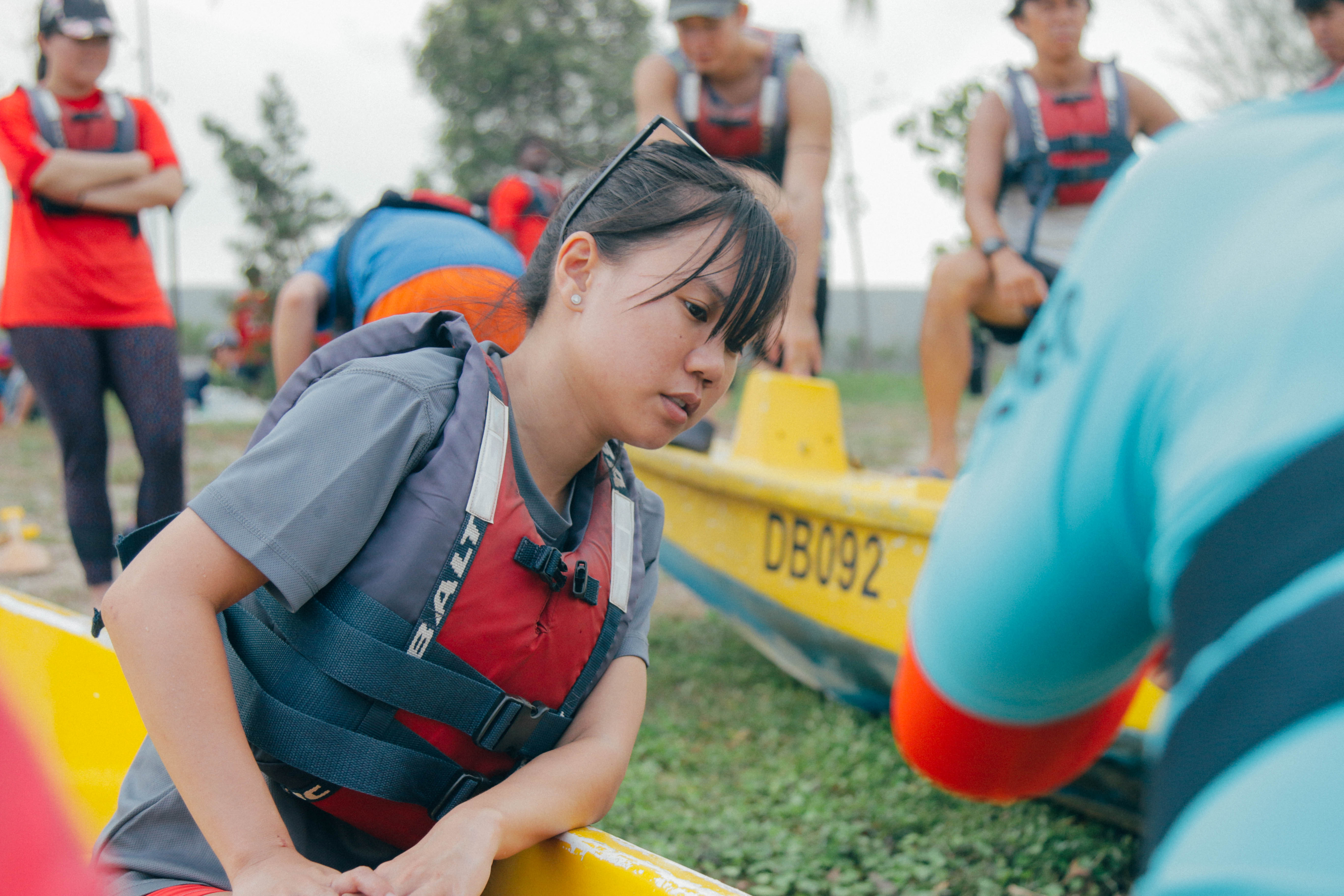 Lam coaching a blind paddler. Photo by Andrew Koay
Lam coaching a blind paddler. Photo by Andrew Koay
Challenges in training
“They responded and they said ‘Coach, I don’t know how to do these exercises’,” recalls Lam.
“Very ignorantly, I replied, ‘Oh, just go to YouTube and check out the videos, right, there’s a lot of how-to’s’. Then they responded back and said, ‘I tried but I don’t understand the videos.’
And I was like, ‘Oh, that’s strange why?’ And then they said, ‘because there’s no subtitles.’
That's when I realised that -- I mean gymming is such an essential part of being a dragon boater. And yet just because there are no subtitles in a YouTube video of how-to’s, the entire deaf community is just axe-ed out of it.”
The realisation led Lam and Ng to explore the possibility of opening a gym catered to PWDs.
The pair had discovered that apart from difficulties understanding YouTube video tutorials, many PWDs were struggling to find accommodating gyms.
“We heard stories of blind people being turned away from gyms even though they know how to operate the machines. They were being turned away for safety reasons -- the staff didn’t know how to work with them, so they turned them away.
Last time in our ActiveSG gyms, when you go in, you actually had to sign in and write your personal details and all that. And we were thinking, someone with a developmental disability -- like autism or other intellectual disability -- there is just absolutely no way they can do that.”
Misunderstandings and misconceptions
However, after some time spent researching the feasibility of a specially catered inclusive gym, the pair concluded that the problem lies beyond meeting the fitness needs of PWDs.
Lam says:
“I think PWDs were worried that they were going to be looked at differently. Like people are going to stare at them. And the general public were just not comfortable existing in the same space.
I think part of the reason why society is currently at this stage is because there’s really no flow of information. People don’t understand people with disabilities, they have no chance to interact, and there was just so much misunderstandings and misconceptions towards this community.”
This was certainly true even for someone like Lam, who grew up under one roof with siblings on the autism spectrum.
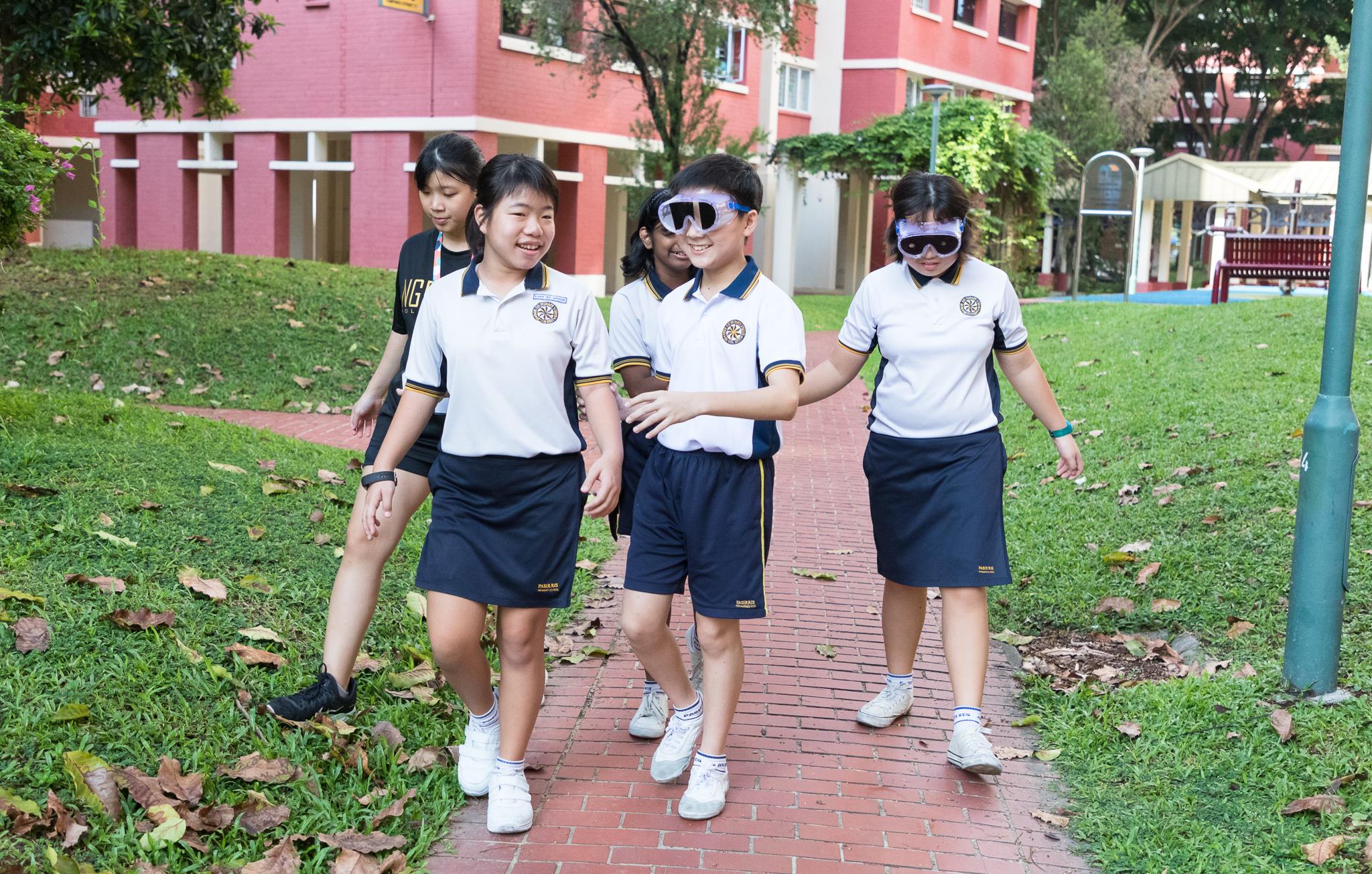 Society Staples conducts activities that help people to better understand PWDs. Photo via Society Staples Facebook
Society Staples conducts activities that help people to better understand PWDs. Photo via Society Staples Facebook
Lam admits that even till today she is still envious of friends who have siblings without disabilities, and the close relationships they are able to have.
Another inclination she continues to fight is the notion that her brothers will end up being an inconvenience to her life:
"I still hold the thought of feeling like my brothers will be my responsibility someday. So if you carefully hear the words I'm using right -- like responsibility -- I think if you ask Ryan, he doesn't see it as a responsibility."
Having harboured misgivings towards them for much of her life, it took an intentional sustained effort to reverse years of prejudice.
Lam says:
“There wasn't one big ah-ha moment. Instead, it was the continuous interactions I had with the community that deepened my understanding of them and autism, which made me rethink the perspectives I had of them.
Having access to information was also very powerful. I finally understood that the characteristic traits of my brothers that frequently annoyed me were all part and parcel of autism, and more importantly, it is also not something they would be able to control or change. That really shifted my opinion of them from thinking they were just plain lazy and couldn't be bothered to one that was more compassionate and understanding towards them.”
Changing perceptions as a whole
It was this “big shift” in her thinking that gave her the drive to start Society Staples with Ng in March 2015.
The goal was no longer about finding solutions to isolated problems that PWDs were facing within society.
Rather the small outfit -- Lam and Ng are joined by a third colleague, Bernice Lim -- Society Staples now works toward changing perceptions as a whole, in the hopes of creating a society where PWDs are seen as part of the mainstream.
Running the social enterprise has been a very steep learning curve for the trio, with each of them performing functions far beyond their official job scopes and having to pick things up on the go.
They've also received help from programmes, such as the Philip Yeo Initiative (PYI), a platform for developing individuals identified as part of the next generation of leaders.
"PYI came in to help us to understand how can the growth be maintained or where should our next path be" explains Ng.
As part of the initiative, Lam is currently being mentored by Aw Kah Peng, the chairman of Shell Singapore.
"She has very, very sharp business acumen sense. So, every time we want to do something new and we go back to her right, she very quickly grasps the concept and she can then poke and identify where are all the gaps, where are all the holes and we start targeting that. So, she really comes in to help us to strengthen the whole business proposal.
We're really very strong in the social impact right, but its really in the business side that social enterprises falter in."
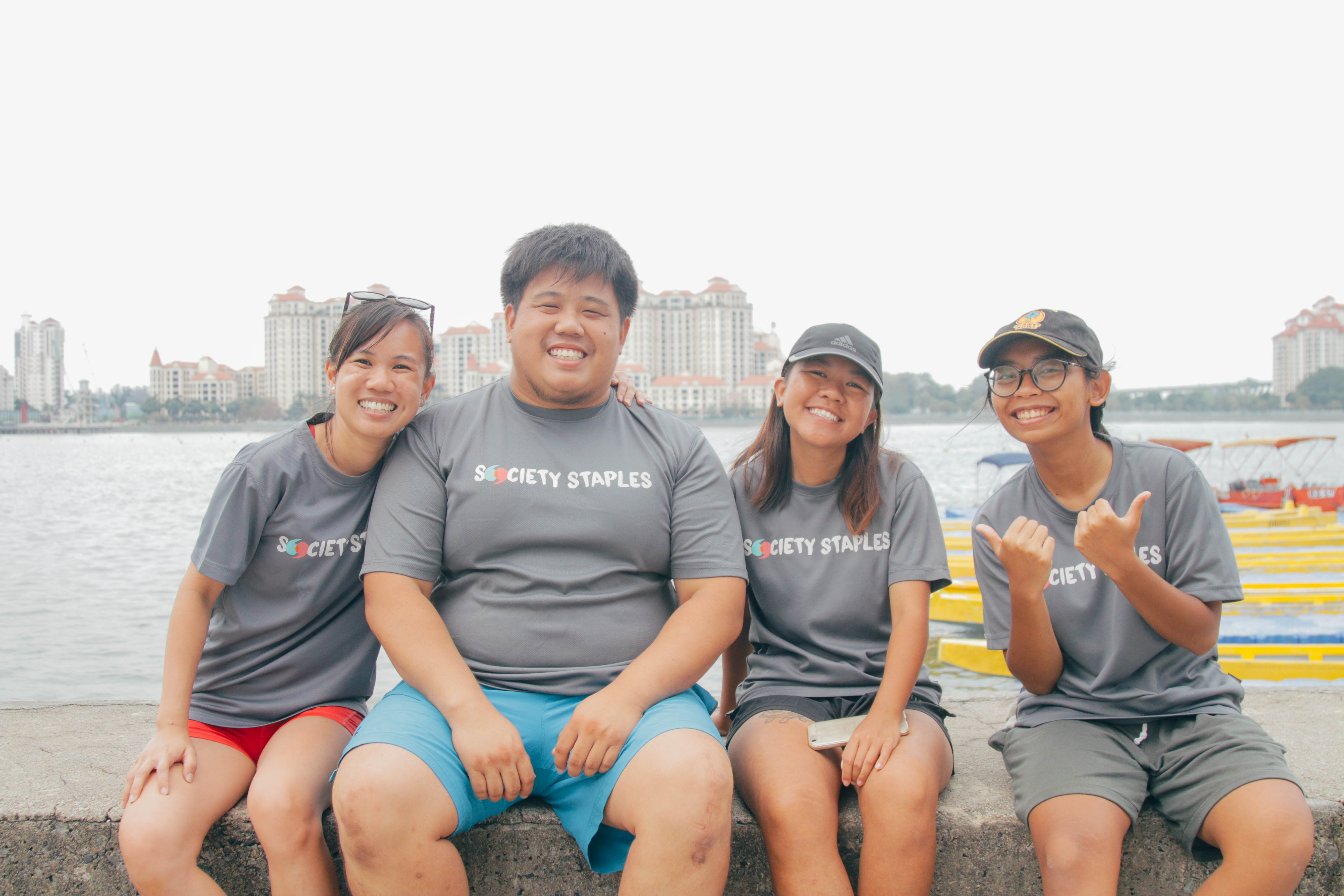 The team behind Society Staples from L to R -- Lam, Ng, Bernice Lim, Nurul Syahindah Binte Tumadi. Photo by Andrew Koay
The team behind Society Staples from L to R -- Lam, Ng, Bernice Lim, Nurul Syahindah Binte Tumadi. Photo by Andrew Koay
Start being inclusive
Readers who are interested can engage Society Staples for their services which include team building activities, corporate social responsibility programmes, and staff training.
It might sound a little ironic, but for Ng, the end goal of all these programs is a Singaporean society “where we can stop being inclusive”.
“Because being inclusive brings across inconveniences. The day where it comes where everybody no longer feels that these are inconveniences, everybody feels that, ‘Hey, this is just the norm’, is the day that we stop being inclusive. It’s the day we can stop using the term.”
Will that ever be the reality in Singapore?
“Not in our lifetime, for sure,” begins Lam before Ng interjects.
“[It’s a] question mark,” he says.
Lam’s admiration is obvious amidst the jesting and laughter: “You see, he’s optimistic right?”
More information on Society Staples can be found on their website or you can drop them an email at [email protected]
Top image by Andrew Koay
If you like what you read, follow us on Facebook, Instagram, Twitter and Telegram to get the latest updates.
